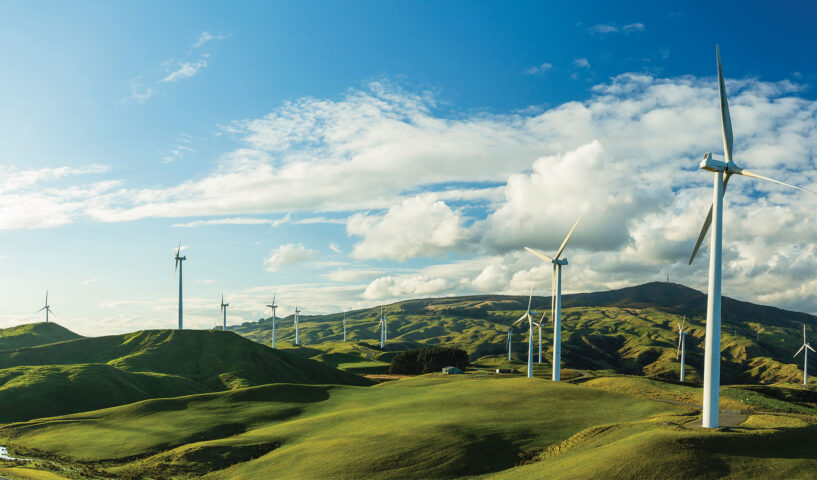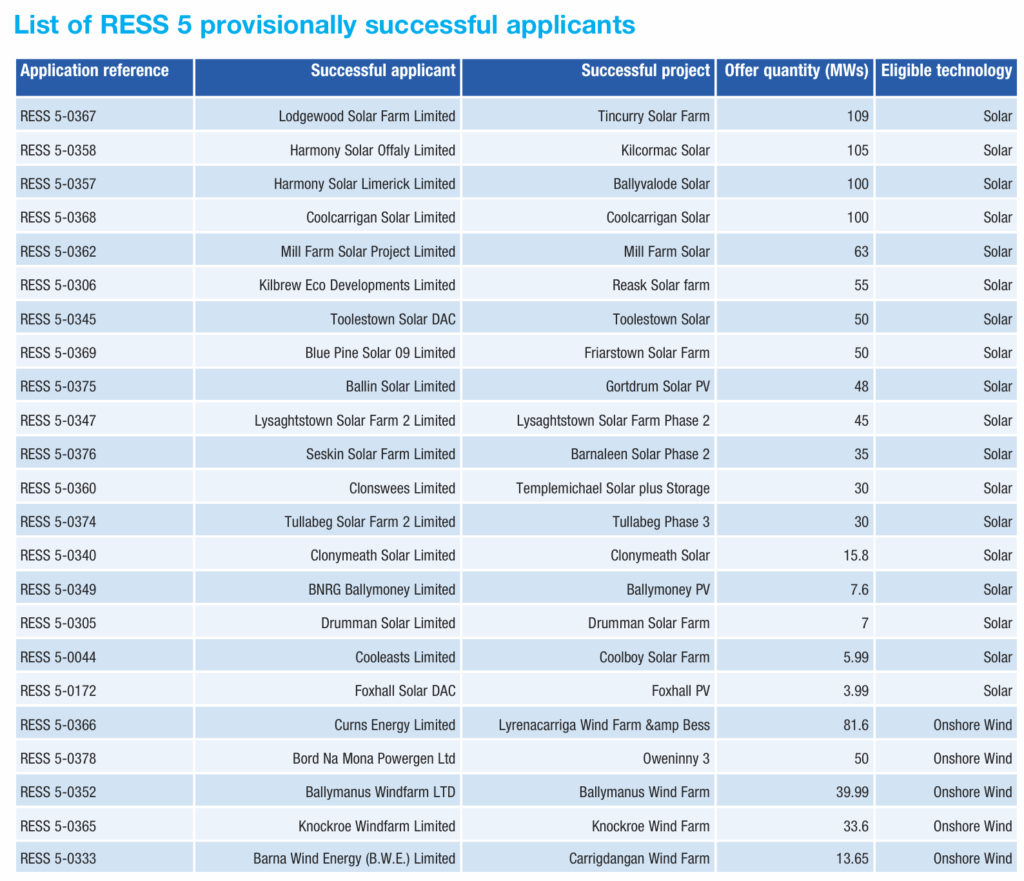
Driving Ireland’s energy future with specialist logistics expertise
13th October 2025
Energy demand and data centres
13th October 2025RESS 5 provisional auction results published

RESS 5 procurement of renewable generation capacity is 19 per cent lower than RESS 4, stifling government efforts to achieve 17GW of renewable energy generation by 2030.
Provisionally announced in September 2025, the fifth auction for the Renewable Electricity Support Scheme (RESS 5) has provisionally procured 1.5GWh (1500 MWh) of generation capacity, which equates to approximately 1,079MW of onshore renewable capacity.
This comprises 219MW of onshore wind and 860MW of solar resulting in a price decrease of 7.8 per cent price decrease for solar and an 11.2 per cent increase for wind energy. The RESS 5 generation capacity figure of 1.5GWh – the maximum target volume set ahead of the auction – is 27.6 per cent lower than the RESS 4 figure of 2.1GWh.
A total of 40 projects applied to participate in the RESS 5 qualification process, and the results qualified 33 projects to participate in the subsequent auction – both these figures represent a sizable reduction in interest when compared to RESS 4.
The average weighted bid for the auction is €98.81 per MWh, representing a marginally higher price than RESS 4 (€96.85), but lower than RESS 3 (€100.47). The weighted average for wind was €100.63MWh and €96.56MWh for solar.
The weighted average bid is the amount of money that successful renewable energy providers are guaranteed to be paid, even when the wholesale price of electricity falls below that level. However, if wholesale prices are higher, the renewable electricity suppliers are required to repay money to customers.
It is a two-way settlement arrangement that provides significant protection to consumers while at the same time aiming to ensure that the projects are economically sufficient to be able to attract the necessary investment.
The volumes secured in RESS 5 (1,079MW) are noticeably lower than those secured in RESS 4 (1,334MW) – a 19 per cent drop – which was in turn a large increase on the RESS 3 figure of 548MW.
The outcome from the auction is set to see 23 major new renewable energy projects delivered over the next four years, mainly in the east, southeast, and midlands.
Included in the allocation are 18 solar farms and five onshore wind developments, which, between them, aim to produce around 200MW of electricity from wind and 860MW from solar, which is enough clean electricity for around 357,000 homes.
Minister of Climate, Energy and the Environment Darragh O’Brien TD, said the “successful auction secures enough clean power for over 350,000 new homes”.
“With this volume of new clean electricity, we are not only reducing carbon emissions and dependence on imported fuels but also generating investment and jobs in communities across the country.
“Accelerating and increasing the deployment of renewable electricity generation… is fundamental to meeting our sectoral climate targets. We are already world leaders for installed wind capacity per capita and for the integration of variable renewable electricity onto the grid. We will continue to advance our clean energy transition to secure a secure, sustainable and resilient energy future”, O’Brien added.
“The deployment and connection of wind and solar energy generation at pace and at scale to our electricity grid benefits households and business by shielding them from volatile fossil fuel imports using our indigenous natural energy resources.”
Describing the auction as “delivering very competitive outcomes”, the Department of Climate, Energy and the Environment states that the auction results “compare well with other recent renewable energy auctions in Europe in terms of volume procured and auction prices, when adjustments for scheme specific designs are accounted for, such as indexation, contract length, and so on”.
Designed to help the State achieve its ambitious target of 80 per cent electricity consumption through renewable energy, RESS 5 provides support to renewable electricity projects in Ireland.
The competitive auction-based framework is designed to promote renewable electricity generation, and the scheme is structured to ensure cost-effectiveness, technology diversity, and community engagement, while also providing clear legal and administrative processes for participants.
The scheme is crucial to achieving the Government’s Climate Action Plan targets of 9GW of solar PV and 8GW of onshore wind capacity by 2030, with renewable energy generation accounting for 80 per cent of energy demand.
In January 2025, Ireland had an onshore wind capacity of 5GW and in June 2025, solar PV capacity reached 1.78GW – 62 per cent and 20 per cent of their respective targets.
In July 2025, Aurora Energy Research, an Oxford-based consultancy, said the RESS 5 scheme is “another costly auction that will likely fail to meet procurement targets”.
“This is largely due to the high-cost environment and project risks not covered by the scheme, such as localised grid constraints.”
Noel Cunniffe, chief executive of Wind Energy Ireland, says that the auction results “means more clean, affordable and secure power for Irish families and businesses”, adding: “It will help to reduce our dependency on imported fossil fuels and to make Ireland more competitive.
“While we are delighted to see five of our projects win contracts, we had hoped for a bigger auction and to see more projects get over the line.
“Our priority now is to focus on finding an alternative route to market for those unsuccessful projects while preparing for next year’s auction by working with the Government to get more wind farms out of the planning system and with secure grid connections.”
Contracts were also awarded to 18 solar energy projects with a combined capacity of 860 MW.
Ronan Power, CEO of Solar Ireland, says: “The RESS 5 outcome, with 860 MW of new projects awarded, continues to validate solar’s ability to deliver at scale, strengthening energy security, creating jobs, and supporting communities. From family homes to schools, businesses and utility-scale projects, solar is uniquely placed to drive Ireland’s renewable transition,” he stated. “Solar achieved an increase of 7.3 per cent in allocation when compared to last year.
A fantastic result that continues to validate solar as the fastest growing renewable and uniquely placed to support our climate action targets.”

